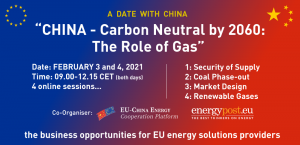CHINA: Carbon Neutral by 2060
the business opportunities for EU energy solutions providers
A series of three online workshops jointly organised by ECECP and EnergyPost.eu

Background
Natural Gas has various advantages as an energy source. Flexible, good energy density, competitive and with lower CO2 emissions than coal. However, natural gas is still a significant CO2 emitter which means its use in the energy mix is, at least in Europe, being strategically managed under energy policy. To summarise greatly, natural gas can play a role during the transition as a bridging fuel, offering an acceptable means to an end for consumers. This applies as much in China as it does in Europe where, additionally, air quality is such a major cause for concern. This creates another driver for the use of Natural Gas and LNG.
Logically, the importance of Natural Gas as a transition fuel means achieving a reliable, competitive supply is an important element. Pipeline routes combined with LNG supplies help achieve this whilst transparent global and regional gas markets are being developed to offer consumers competitive, more predictable and affordable prices.
Looking further ahead, renewable and low-carbon gases present society with an opportunity to keep gas in the energy mix long-term – i.e., post-transition. The development of renewable and low-carbon gases and their integration into the energy system is therefore a crucial factor in how the role of gas is analysed for its economic and climate impact.
As is the case in Europe, in China the emphasis is on rapid growth of renewables with its dual advantage of carbon neutrality and energy independence. Nevertheless, in the meantime, the role of gas is important. How it will evolve is what we will consider here; sharing expert knowledge on all the pertinent issues over the course of four sessions.
- Session One: Security of Supply
- Session Two: Gas for Power?
- Session Three: Competitive Markets
- Session Four: Renewable Gases